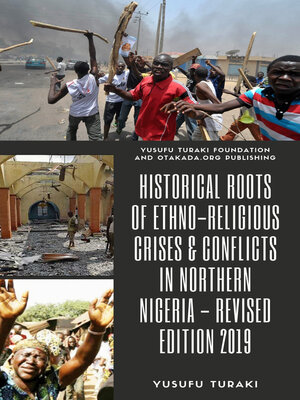Historical Roots of Ethno-Religious Crises and Conflicts in Northern Nigeria
ebook ∣ Revised Edition 2019
By Yusufu Turaki

Sign up to save your library
With an OverDrive account, you can save your favorite libraries for at-a-glance information about availability. Find out more about OverDrive accounts.
Find this title in Libby, the library reading app by OverDrive.



Search for a digital library with this title
Title found at these libraries:
| Library Name | Distance |
|---|---|
| Loading... |
Historical Roots of Ethno-Religious Crises and Conflicts In Northern Nigeria
Revised Edition 2019
Yusufu Turaki
This book updates my earlier books: The British Colonial Legacy, 1993; Theory and Practice of Christian Missions, 1999 and Tainted Legacy: Islam, Colonialism and Slavery in Northern Nigeria, 2010. Instead of revising each book, I decided to write this book as a follow-up to the long-term consequences of the traditional, Islamic, colonial and missionary legacies upon post-colonial and independent Nigeria. The book seeks to show how the politicians and soldiers addressed the politics of ethnicity, regionalism and religion in both colonial and post-colonial Nigeria. The book primary examines and analyzes the historical roots of ethno-religious crises and conflicts in Northern Nigeria as rooted in the legacies of African traditions, Islam, colonialism and Christian missions. This requires that we develop a new comprehensive and appropriate methodology of addressing and evaluating the prevalent and pervasive ethno-religious crises and conflicts in Northern Nigeria. People have sought to address this very issue by using two basic approaches. The first and easier approach is to examine the immediate causes of ethno-religious crises and conflicts. The readily available causes are usually named as religious, ethnic, political, or economics. These surface analyses tend to examine the nature of social interactions and networks and the use of religion, ethnicity, politics, or economics by various people groups that tend towards crises or conflicts. The categories of people who over-use this approach are mainly foreign researchers, journalists and social media practitioners as well as Government functionaries. They tend to look for quick and easy answers and solutions to the immediate crises and conflicts. This approach tends to overlook the deeper question, especially the historical roots of crises and conflicts.







